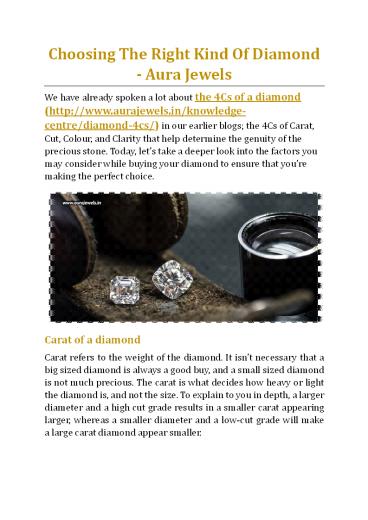Choosing The Right Kind Of Diamond - Aura Jewels - PowerPoint PPT Presentation
Title:
Choosing The Right Kind Of Diamond - Aura Jewels
Description:
Walk into the best diamond jewellery shops in Bangalore where you can confirm to get genuine diamonds and the right purchasing advice. Or, follow these tips to make the right purchase. – PowerPoint PPT presentation
Number of Views:35
Title: Choosing The Right Kind Of Diamond - Aura Jewels
1
Choosing The Right Kind Of Diamond
- Aura Jewels
We have already spoken a lot about the 4Cs of a
diamond (http//www.aurajewels.in/knowledge-
centre/diamond-4cs/) in our earlier blogs the
4Cs of Carat, Cut, Colour, and Clarity that help
determine the genuity of the precious stone.
Today, lets take a deeper look into the factors
you may consider while buying your diamond to
ensure that youre making the perfect choice.
Carat of a diamond Carat refers to the weight of
the diamond. It isnt necessary that a big sized
diamond is always a good buy, and a small sized
diamond is not much precious. The carat is what
decides how heavy or light the diamond is, and
not the size. To explain to you in depth, a
larger diameter and a high cut grade results in
a smaller carat appearing larger, whereas a
smaller diameter and a low-cut grade will make a
large carat diamond appear smaller.
2
- Cut of a diamond
- The cut determines how the light enters and
leaves a diamond, bringing a reflection and
sparkle to the stone. For instance, shallow cuts
have the light to escape through the bottom of
the diamond, while deep cuts have the light to
escape out the side. Thus, you must ensure the
best cut that can help you have a diamond that
can sparkle for generations to come. - Colour of a diamond
- The highest quality diamonds are colourless,
while low grade diamonds are generally pale
yellow. The GIA grades diamonds on a scale of D
to Z, with D being colourless and Z being yellow.
There are six such categories on the GIA diamond
chart. D to F category diamonds are of the
highest quality, which is why they are rare and
expensive. G to J diamonds are near-to-colourless,
but are affordable, which makes them an
excellent value for buying on a budget. And,
diamonds close to the Z category shouldnt even
be considered. - Clarity of a diamond
- If you think you must buy diamonds that are clear
and flawless, think about it again. Diamonds are
minerals mined from the earth, which means
imperfections, blemishes, and inclusions are
obvious. On the other hand, diamonds that are
clear with no blemishes or flaws are in fact
lab-made, which means they are not natural. So,
if you hold a diamond that has clouds, cavities,
grains, spots, breaks, chips, pits, polish
lines, and scratches, you must immediately
understand that the diamond is a natural one. In
fact, GIA has seven categories of clarity
grading too. - FL Flawless (visually flawless)
- IF Internally Flawless (small surface blemished)
3
- VVS Very Very Slightly Included (very tiny
inclusions) - VS Very Slightly Included (minimal inclusions)
- SI Slightly Included (noticeable inclusions)
- I1 Included (visible inclusions)
- I2 I3 Heavily Included (obvious inclusions)
- There are a variety of factors that affect the
clarity of a diamond. Some include the size of
the inclusions or blemishes in the diamond, the
number of flaws, the position of the inclusions
or blemishes, and the contrast between the
diamond and the flaws. - Other factors
- Fluorescence This is the glow of a diamond when
it emits visible light. A diamonds fluorescence
is graded by its intensity. While GIA considers
fluorescence as an identifying characteristic of
a diamond, it also voices that an average
observer will not be able to detect any
systematic effects of fluorescence. - Shape Some popularly admired diamond shapes
include round cut, princess cut, emerald cut,
asscher cut, marquise cut, oval cut, radiant
cut, pear shape, heart shape, and cushion cut.
Each cut has its own uniqueness and gives its
own brilliance. - All these factors considered well can help you
make the right diamond purchase. However, if all
of this is too much to digest for you, you can
simply just rely upon the advice of Aura Jewels,
one of the best diamond jewellery shops in
Bangalore, where you can rest assured to get not
only the right advice, but also only genuine
real diamonds. - For more Information http//www.aurajewels.in/































